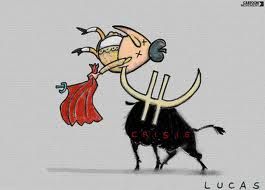I found this informative discussion at naked capitalism. It’s in two parts with links that are educational, especially for those of us who have a minimal understanding of economics. The first article by Michael Hoexter of New Economic Perspectives is prefaced by Yves Smith:
The discussion of tribal allegiances in economics in this post helps illustrate why it is so difficult to push back against failed ideas when they are dear to the mainstream. It is also a useful ethnographic guide.
Is an Anti-Austerity Alliance of Left Neo-Classicals and Post-Keynesians Possible? Is it Desirable? (Part 1)
I drafted the “Mixed Economy Manifesto” as one attempt to create a common basis for anti-austerity economists and non-economists to argue against, in the clearest terms possible, the waves of government spending cutbacks that are advocated by misguided elites, by the right-wing and by right-leaning neoclassical economists. The 87 “theses” listed at the end of the Manifesto enumerated empirically and logically sound propositions about the economy as it now exists with its mixture of government and private institutions that can under many circumstances productively interact with each other. (I may attempt or others may attempt to expand the arbitrarily numbered 87 to 95 theses which would then be suitable for nailing on doors.) The Mixed Economy Manifesto also contained many statements that would appeal to Left Neo-classicals or New Keynesian economists, while maintaining a basis in what I perceive to be the more realistic ideas about the economy that have been put forward by post-Keynesians, MMTers, and the institutionalist tradition, including Thorsten Veblen and John Kenneth Galbraith.
As it stands, the world appears to be heading into a policy-induced exacerbation of the ongoing Second Great Depression that may pale in comparison to the policy mistakes of 1937 in the US, when President Roosevelt listened too much to the hard-money ideologues of his day and cut spending only to weaken the ongoing recovery from the Depression of the 1930’s. It would seem to make sense to create an alliance of as many intellectual and political tendencies as possible against a repeat of these mistakes. One major problem is that the public is largely unaware that there is a choice, so has not yet joined the struggle, except in countries like Greece and Spain where austerity is now in full force.
Another major problem in creating such an alliance is that there are significant intellectual and institutional divisions among those economists who endorse counter-cyclical spending by government and/or mobilizing the resources of government to help the unemployed and the marginally employed. These economists disagree with each other about fundamental issues and, if listened to by the public closely and in sequence, can produce either confusing or not particularly decisive advice for anti-austerity activists. This in turn makes it difficult to create a mass political movement that opposes austerity measures before they take full effect or, furthermore, after some future political victory for anti-austerity forces, for policymakers to institute policies based on a consistent new economic thinking. The most consistent critics of austerity and the economic foundations of austerity thinking have been Post-Keynesians, a diverse grouping of schools that claim to be both heirs and critics of Keynes, including the growing Modern Monetary Theory school (MMT). Post-Keynesians are generally excluded from the centers of power within the economics profession, though are not as marginalized as biophysical, steady-state/ecological, and Marxist economists. “New Keynesianism” is a much more mainstream school that integrates certain aspects of Keynes into the dominant neoclassical economics taught in college Econ 101 courses. Often the publicly-identifiable Left of mainstream economics, for instance Paul Krugman and Joe Stiglitz, can be identified as New Keynesian and therefore fundamentally neoclassical.
Post-Keynesians and MMTers often direct their sharpest critiques at New Keynesian or Left Neo-classical economists, though there are also efforts at comity from the side of Post-Keynesians. On the other side, the more orthodox and “establishment” New Keynesians/Left Neoclassicals for the most part do not offer Post-Keynesians the professional respect of acknowledgement and/or serious intellectual critique of Post-Keynesian/MMT ideas. There are signs that this “Chinese wall” is breaking down, as the global Depression drags on, but often in ways that indicate that isolated terms from or fragments of Post-Keynesianism and MMT may be taken and reconfigured to fit the orthodox model and academic “lifestyles” of Left Neo-classical economists. This was the intellectual “move” that Paul Samuelson executed in the late 1940’s, validating those parts of Keynes that would fit with neoclassical orthodoxy, while leaving out the aspects of Keynes’s work that suggested that neoclassical orthodoxy should be fundamentally questioned or overturned.
Is an Anti-Austerity Alliance of Left Neo-classicals and Post-Keynesians Possible? Is it Desirable? (Part 2)
United as they are in their critique of neoclassical economics, it would be a mistake to portray post-Keynesians as united among themselves, a further complication for the emergence of any unified message from anti-austerity economists. Post-Keynesian Thomas Palley has recently likened MMTers proposal that government institute a WPA-style “job guarantee” program to the policies of the Tory Cameron government that unemployment benefit recipients work for free. Palley’s concern is that the MMT job guarantee will undermine public sector unions but MMTers dispute that Cameron’s policy is a job guarantee program. Palley’s objections to the job guarantee and MMT were also the subject of a caustic review by Randy Wray, a prominent MMT economist. Steve Keen, who calls himself as “Monetary Circuit Theorist”, has shown an interest in finding points of commonality with MMTers while maintaining at other times a distance from it. MMT, perhaps because it has a popular following and momentum, seems to be a particular target of criticism and self-differentiation by non-MMT post-Keynesians. Perhaps this criticism is meant to be constructive but at times the disputes are often conducted in relatively heated exchanges in blogs and on Twitter, where ultimately outsiders to these disputes will remain confused and will perhaps throw up their hands.
The question then remains whether these two groups of economists can work together and fight against austerity as a loosely coordinated group, even if they themselves are not even in agreement among themselves. From the perspective of those outside of the economics profession, the prime consumers of the output of economists, a cogent and unified message against austerity would be a great help. Political movements and political actors require a unified message to achieve power. As well, to be ultimately a success if they ever achieve power, they need to have a realistic policy alternative to offer. As it stands, the voices of the Left Neoclassicals are heard much more widely, yet their vision ultimately does not offer political leaders and political activists on the ground a portable vision and argument to reshape overall policy and popular views. Post-Keynesians, in particular MMT, are working on a more realistic vision of how the economy and government work and work together that potentially is comprehensible by a wider group of people. Yet this vision, though now gaining a wider audience, has not yet achieved critical mass in the public discussion. [..]
If some prominent economists from orthodox and heterodox tendencies could agree that it would be possible to come up with a list of three to five anti-austerity principles which do not offend any “side” to this debate, this might be a way forward. These principles could then become “talking points” for economists to campaign in the media and in meetings with the powerful for an anti-austerity solution. Creating an anti-austerity “echo-chamber” would be a step in the right direction. As an independent commentator on economics not currently affiliated with an academic institution, I do not have the status to get the ball rolling on this process.
If economists, like cats, cannot be “herded” into producing a workable statement of anti-austerity principles, then the diffuse strategy of producing articles, blog posts, testimony, and media appearances becomes second best but offers a glimmer of hope that the perversity of austerity will be communicated to the broader public.
This effort, however, should not compromise or derail the long-term epistemological project to build a better social science and a better economics that can help prevent concurrent disasters like the present ones. Temporary political victories can only buy time but ultimately cannot solve the problems of governing and managing mixed economies, the type of economy in which we live and that has sorely challenged conventional wisdom.

 As
As  The economic crisis in Spain was supposed to have been resolved in an
The economic crisis in Spain was supposed to have been resolved in an  The heads of state of the EuroZone countries met in Brussels today for a two day summit to try to come to an agreement on
The heads of state of the EuroZone countries met in Brussels today for a two day summit to try to come to an agreement on
Recent Comments